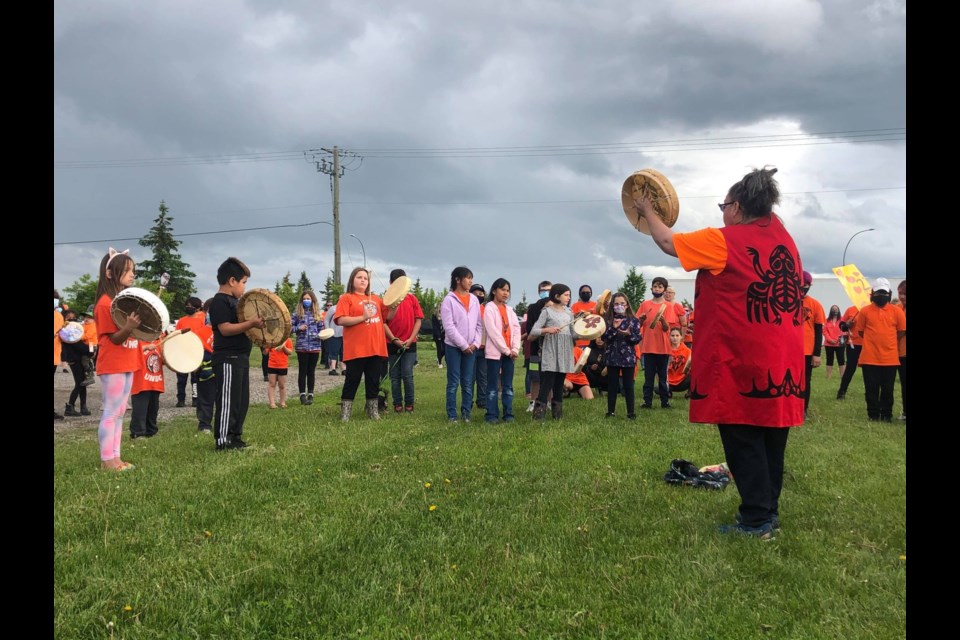Hundreds gathered Monday near School District No. 57 (SD57) offices on the corner of Highway 16, wearing orange and holding drums, to honour the lives of the 215 children discovered buried at Kamloops Residential School.
Cars honked in support as nearly 200 people, including SD57 school trustees and staff, rallied for those children and residential school survivors.
The event was organized by Sonya Rock, a Gitxsan member, residential school survivor and teacher at Nusdeh Yoh Elementary.
“I went to Port Alberni Residential School and both my parents went to residential school. My dad went to Edmonton and my mom went to Lejac and all of my other 10 siblings – all of us 11 children went to residential school,” says Rock.
“I could imagine what all the other survivors were going through. Right away it brought back memories of my own experiences at Port Alberni."
Rock says she was not able to sleep since May 27 when the Tk’emlúps te Secwépemc confirmed they found the remains of 215 children buried at the site of the former Kamloops Residential School because her heart was so broken.
“We all went through the sexual abuse, the physical abuse, the spiritual abuse. Being separated was really the hardest thing to be taken away from our parents and brought to the residential school.”
Tk’emlúps te Secwépemc found the remains with the help of a ground-penetrating radar specialist. The band anticipates having a full report ready by mid-June as work is still being done on the site to potentially find more remains.
“The thing that hurts me the most is to know that with this new technology this is just the beginning because there were so many residential schools throughout Canada and the United States,” says Rock.
“Our children have been murdered. This is genocide and it continues. You hear from people all the time ‘why can’t you just get on with it’ — this is the reason why we can’t get on with it. Colonization continues today and we continue to be affected by it.”
Rock says she feels uplifted by the turnout and prays for peace for the 215 children found and their families.
“I want Canada to know that this is true. We were always doubted. People actually don’t believe residential schools existed and that they happened. Well, you have the evidence right here,” added Rock. “I’d like to ask you to stand up and use your voice to stop the continued colonization against the Indigenous people of Canada.”
Many of the people in attendance also attended a gathering organized at the site of the former Lejac Residential School near Fraser Lake on Sunday.
“I was at Lejac Residential school yesterday and I was able to hear some stories from some of our survivors,” said Pam Spooner, director of instruction for SD57 Indigenous Education, to the crowd.
“Everyone has different stories and it is important to hear all of them and to understand that we have Lejac Residential School an hour and a half away and so many people don’t realize that it’s in Fraser Lake. We are here to honour all of the Kamloops survivors but I also feel like this is the beginning and I want everyone to be prepared because there is going to a lot more and a lot more healing that needs to be done.”
Lejac Residential School, located about 160 kilometres west of Prince George, remained open until 1976. The Truth and Reconciliation Commission has stated at least 3,200 children died amid abuse and neglect in Canadian residential schools.
Acting Superintendent Cindy Heitman also shared a few words, before the drummers led the group in healing songs.
“This is a challenging time for all of us and to see everyone gathered here in support warms my heart,” said Heitman. “I see education as our pathway forward and our opportunity to come together as a community and I am overwhelmed right now by the support here today.”
The gathering concluded with Rock leading all of the children in attendance in a special song together.
The Lheidli T’enneh Nation will also be lowering its flags at all buildings tomorrow (June 1) beginning at noon for 215 days in honour of the children.
A national Indian Residential School Crisis Line has been set up to provide support for residential school students and their families. If you are in need of counselling or support call the 24-hour national crisis line at 1-866-925-4419.
- with files from the Canadian Press






